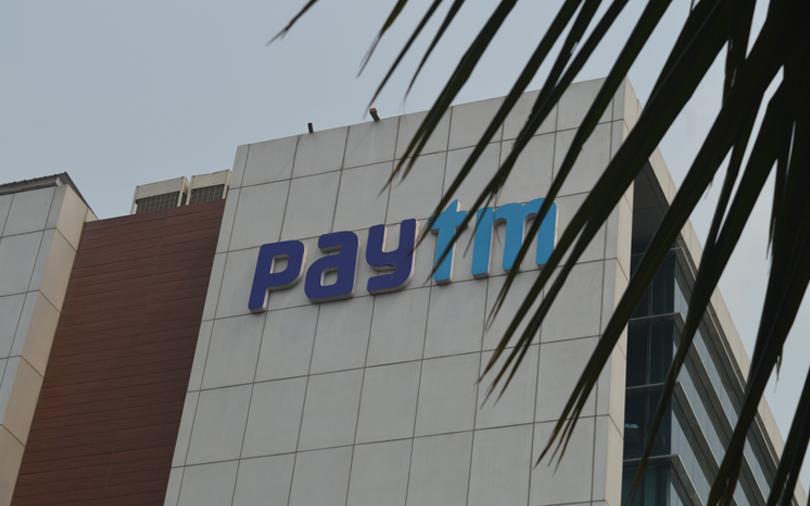Shares of One97 Communications, the parent of Paytm, fell by as much as 5% in early trade on Friday, following a report by an advisory firm opposing its chief Vijay Shekhar Sharma's reappointment as CEO and raising doubts on the company's path to profitability.
Paytm's shares dragged down even as the company said in its stock market disclosure on Friday that its loan distribution business scaled to 2.9 million total loan disbursals during the month of July, growing by 296%.
This aggregates to a total loan value of Rs 2,090 crore ($264 million) during the month, growing by 512%.
“We continue to work with our partners to review the evolving macro environment and accordingly slight moderation may be expected in our growth. That said, we continue to see ample growth and upsell opportunities in this business and are focusing on quality of the book (given possibility of macro headwinds),” the disclosure noted.
However, this was not enough for Paytm's shares to recover. Shares of Paytm were trading at Ra 792.15 apiece, down 4.4%, on the BSE, in afternoon trade.
The shares fell largely after Paytm’s proposal to reappoint Vijay Shekhar Sharma as the CEO for another five years was opposed by advisory firm Institutional Investor Advisory Services India Limited (IiAS). The advisory firm, in a detailed report, also flagged the remuneration decided for the post.
Vijay Shekhar Sharma's FY23 remuneration is estimated at Rs 796.28 crore which comprises 21 million stock options at an exercise price of Rs 9, a deep discount to the market price on the date of grant (fair value spread across the vesting period), the IiAS report noted. He was also granted 46.5% of the entire stock option pool, which is equal to 3.2% of the outstanding share capital. But there is no disclosure regarding the vesting conditions, the report said.
"His overall remuneration is higher than the remuneration levels of all S&P BSE Sensex companies’ CEOs – and most of these companies are profitable. The company is seeking shareholder approval for the
proposed remuneration as minimum remuneration – which will be paid to him even if the company continues to report losses," the report pointed, opposing his remuneration.
The report also opposed the proposal to reappoint Ravi Chandra Adusumalli as director. Adusumalli is founder and managing partner at Elevation Capital (formerly SAIF Partners), an early investor in Paytm.
"We note that Ravi Chandra Adusumalli is a member of the Audit Committee. We raise concern over the issues raised by the auditors, that loans and advances extended have had delayed repayments, and that the company, despite reporting staggering losses, proposes to spend Rs 100 million annually on charitable donations," the report noted. The report was also critical of Adusumalli for attending only 47% of the board meetings in FY22.
The report while supporting the appointment of Madhur Deora as whole-time director, raised red flag over his remuneration as well.
"We estimate Madhur Deora’s remuneration at Rs 358.5 million for FY23, which is high for the size and performance of business and not in line with peers," it stated. Deora has been associated with Paytm since 2016. He was previously with Citigroup Global Markets India.
IiAS further said in the report that since listing, the company’s stock price has fallen by 63.6% (from the issue price of Rs. 2,150), resulting in wealth destruction for shareholders.
“Vijay Shekhar Sharma has made several commitments in the past to make the company profitable, however these have not played out. We believe the board must consider professionalizing the management,” it said.
Paytm's net loss widened to Rs 644.4 crore in the June quarter against a loss of Rs 380.2 crore in the corresponding quarter of the last financial year.
The IiAS report also observed that on Paytm's financial statement for FY22, it has relied upon the auditors’ report, which has raised an emphasis of matter, regarding uncertainty related
impact of Covid-19 and non-realization of foreign currency receivable balances of Rs 35.5 crore outstanding beyond the stipulated time period. An emphasis of matters is a paragraph included in the auditor’s report that refers to a matter appropriately presented or disclosed in the financial statements
that, in the auditor’s judgment, is of such importance that it is fundamental to users’ understanding of the financial statements.
The IiAS report also said that it raises concern on loans (including interest) aggregating Rs 106.8 crore to five entities, where repayments have been delayed. The nature of the relationship with some of these entities is unclear, it added
Paytm’s stock has taken a hammering in the capital markets since it got listed on the bourses in November last year at an IPO price of Rs 2,150. At the IPO price, Paytm had a market capitalization of nearly Rs 1.4 trillion, which has since reduced to Rs 51,411.69 crore.
Hence, it has also lost its tag as the most-valued startup in India to Byju's (at the IPO price, it was seeking a valuation of about $600 million more than the edtech startup's valuation). The company also lost its tag as the most-valued fintech startup in India, and now trails RazorPay's $7.5 billion valuation in the Indian fintech space.
Earlier this week, SoftBank Group Corp said it has marked down its investment in Paytm by $400 million for the quarter ended June, adding to its overall loss of $23.1 billion for the period.
The tech firm’s investment cost in One97 Communications was $1.4 billion in 2017, made through a mix of primary and secondary share purchases. The fair value of its investment stood at $1 billion at the end of 30 June, according to its financial statement posted, indicating an on-paper loss of $400 million.






